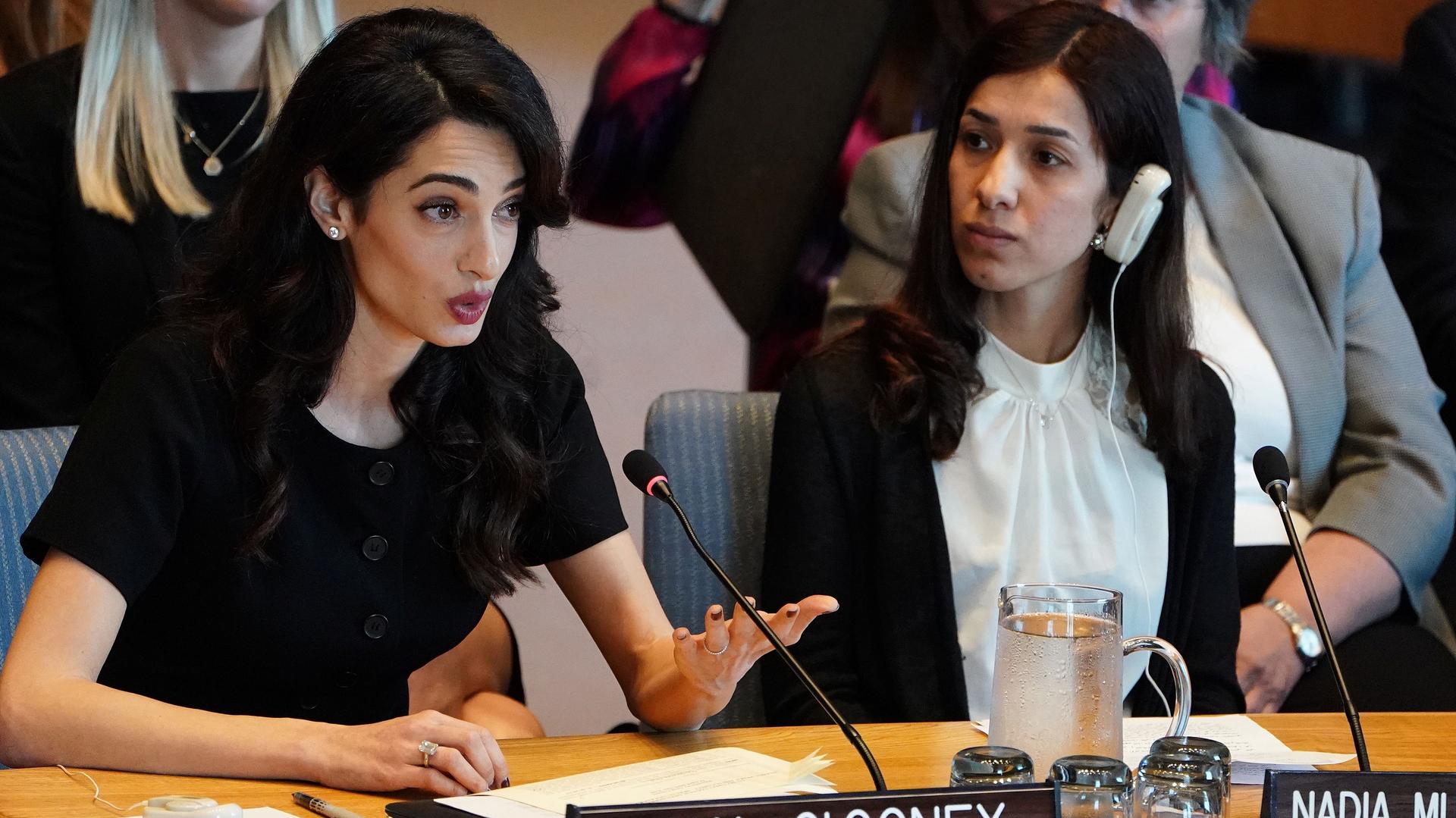A UN resolution condemning sexual violence against women should’ve been uncontroversial
Nadia Murad listens as Amal Clooney speaks at the United Nations Security Council during a meeting about sexual violence in conflict in New York, April 23, 2019.
On Tuesday, the UN Security Council passed a resolution condemning sexual violence in war. It should have been an uncontroversial vote.
But the resolution was only approved after language referring to sexual and reproductive health was taken out.
The US delegation had threatened to veto the resolution in keeping with the Trump administration’s opposition to any measure by the UN body that even implies support for abortion.
Amanda Klasing co-directs the women’s rights division at Human Rights Watch in Washington, DC. She talked to The World’s host Marco Werman about the resolution and what it means for women who are victims of sexual violence in wartime.
Amanda Klasing: Rape as a weapon of war is something that has been documented over the last few decades, but is certainly pervasive. It’s when the parties to a conflict have used sexual violence to instill terror, to really try to break social fabrics and try to humiliate and harm civilian populations. You see this when women are fleeing from conflict. You may see it when the military tries to occupy a community. We also have seen that the knock-on effects of this type of violence can last decades.
Marco Werman: How did this resolution, at least in the eyes of the White House, imply support for abortion?
Surprisingly, they have just read into every mention of sexual reproductive health and rights, the idea of abortion. When we talk about sexual reproductive health and rights, particularly for victims of sexual violence, what we’re talking about is the broad range of services that are needed for somebody who’s been raped. That includes access to emergency contraception, prophylaxis, so that they don’t have sexually transmitted infections and in some cases, that might mean access to abortion or prenatal care if they choose to continue a pregnancy.
Related: Why did the US try to block a UN resolution encouraging breastfeeding?
I mean, they ultimately signed the resolution. How watered down was the language?
They actually removed all language related to reproductive health and also removed a paragraph that refers to an earlier UN Security Council resolution that talks about sexual reproductive health and rights.
So, what does the resolution actually say now? What does that mean on the ground for women who end up in a horrific situation?
So, the resolution looks at a broad range of issues including an accountability for acts of sexual violence in conflict. In practice, the resolutions that previously exist still hold true. But what it means is that governments won’t feel as compelled to make commitments to ensure that all range of services are available to victims of sexual violence in conflict.
So, the original resolution was submitted by Germany. How did they — and other countries that wanted to have the original language — react to the change?
Germany was in a really difficult position with the US actually flexing its veto. They had to choose whether or not to remove this language or to say the whole resolution die, essentially. And so they conceded this language. It certainly is a step back from global consensus around what it is women who have been raped in war deserve to access after they’ve had such a terrible thing happen.
Related: US cuts funds to UN agency supporting Palestinian refugees
Why did Russia and China abstain from the vote?
They abstained from the vote related to some other issues within the resolution. China was concerned about language about women human rights defenders, and Russia did not agree to language regarding LGBT rights.
So, how much weight does this resolution actually carry — is it another nonbinding, symbolic statement from the UN, or do you think there are real teeth in this?
I think the biggest concern here is that we have seen over the last couple of years a broad, global attack on women’s rights and the UN has really been a challenging place to reassert global consensus on women’s rights. So, it’s reflective of the power that the Trump administration has to really influence backtracking on women’s rights. And you see, it’s not just in conflict, but as we see rising authoritarianism, rising populism. It’s often the women’s rights activists that are in the front line of being attacked when we have countries like the United States allying with other countries like Russia and Saudi Arabia to try to roll back women’s rights. It really puts women on the front lines at risk and leaves them alone.
